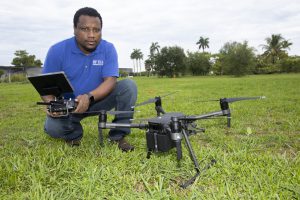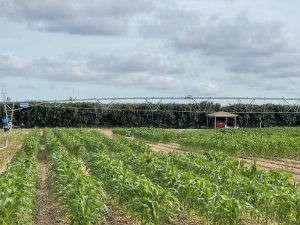Water. We wash the dishes, draw a bath, and run the washing machine, but thanks to a public utility system that delivers a seemingly endless supply of fresh, clean water to our indoor taps and outdoor hoses, we rarely have to think about how much water we use, much less where it comes from or where it is going.
In Florida, in general, there always seems to be plenty of water. We’re surrounded by it in a state of beaches, lakes, wetlands, and rivers. Underground, the Floridan aquifer quietly supplies millions of gallons a day to Florida springs and wells. Overhead, our regular, torrential rains deliver some of the highest annual rain totals in the U.S.
But water is not unlimited. Florida’s water supplies are being strained by its growing population of 20 million and a massive hospitality industry that hosts over 100 million visitors a year. Florida also has a huge agricultural sector that takes up almost a quarter of the state’s 42 million acres and is the top national producer of tomatoes, oranges, bell peppers, grapefruit, watermelons, and sweet corn as well a significant producer of dozens of other fruits and vegetables and ornamental and landscape plants.
Cities and industries across Florida use vast amounts of water, and they are feeling the crunch caused by their own ever-increasing water use. Agricultural producers are on the front lines of water issues in Florida. Water is a critical part of their livelihood, and for them, water is a science, not just a commodity. In a typical agricultural operation that uses millions of gallons of water each year, small savings here and there add up to big savings across the entire enterprise, with conservation and environmental benefits like reductions in water draws and less agricultural chemicals shed into the groundwater and nearby water bodies.
Enter Dr. Haimanote Bayabil.

Dr. Bayabil is an Assistant Professor of Water Resources in the UF/IFAS Department of Agricultural and Biological Engineering, based at the Tropical Research and Education Center (TREC) in Homestead, Florida. Dr. Bayabil is an expert in the small savings mentioned earlier that add up to major positive impacts on conservation, environmental protection, and agricultural productivity and profitability. Dr. Bayabil achieves these feats using the latest science and technology.
While water may seem like the simplest and most familiar of substances, it is actually amazingly complex in its interactions with plants, soil, topography, weather, and sunshine.
Dr. Bayabil’s education and experience have prepared him to examine all of these interactions and take them into account as he develops “practical and sustainable water management practices that conserve freshwater resources while at the same time enhancing plant yield and water quality.”
A sample of Dr. Bayabil’s current research will serve to highlight the processes and goals of his approach.
Dr. Bayabil’s Hydrology & Irrigation Research group was recently awarded a grant in which they will use computer models to analyze soil moisture data and moisture measurements collected by unmanned aerial vehicles (UAVs, or drones). The goal is to develop measurement techniques that will lead to better estimates of how much water escapes into the atmosphere by evaporation from soil and transpiration from plants. This process of water escaping is called evapotranspiration, and understanding it is important if we want to know how much irrigation water to apply. The project is being conducted in fields for two commodities: sweet corn and green beans. As always, the methods developed in this project can be applied to other commodities and in other locations.
Another key point illustrated by this research is that it takes scientists with different backgrounds to create the collective expertise necessary to ask the right questions, design the right experiments, and interpret the results. In this case, scientists from the University of Florida and the U.S. Geological Service (USGS) are working together. Dr. Bayabil’s broad background in water management problems allows him to be effective both in communicating with the diverse specialists on the team and in guiding the work.

In another project, Dr. Bayabil and his team will investigate the many impacts of soil salinity due to saltwater intrusion. Florida is surrounded by saltwater, but underground pressure of fresh groundwater flowing down to the sea holds the seawater in check. As Floridians withdraw more water from the ground, especially in intense coastal developments, the pressure is reduced, and salt water can begin to “intrude” and replace fresh groundwater. Again, this seems simple, but it is extremely complex and has many impacts, such as changing the physical and chemical properties of soil, depleting soil nutrients, and killing many plants that cannot tolerate salt water. A surprising effect of saltwater intrusion is that it can increase greenhouse gases and contribute to global warming. When the fresh water in seaside wetlands is replaced by salt water, the saltwater reduces the number of carbon-absorbing plants, and, it could also lead to increased greenhouse gas emission by promoting the growth of microorganisms that decompose plant material, thus increasing carbon dioxide.
Dr. Bayabil’s team will use a variety of investigative techniques to evaluate the effects of salt water intrusion and the effectiveness of several management strategies to help reduce the effects of salt water. These methods include using different types of soil additives that can reduce the soil’s salt content, such as biochar, salt-repelling hydrogel, gypsum, and organic mulch.
These are just two of Dr. Bayabil’s ongoing projects. They work on a small scale, but they have implications on a global scale. The issues of water conservation, increasing agricultural productivity, salt water intrusion, and coastal development are important around the world, in rich countries and in poor ones.
That’s UF ABE: Big Questions, Global Reach!
This article was written by: Charles Brown

 0
0
